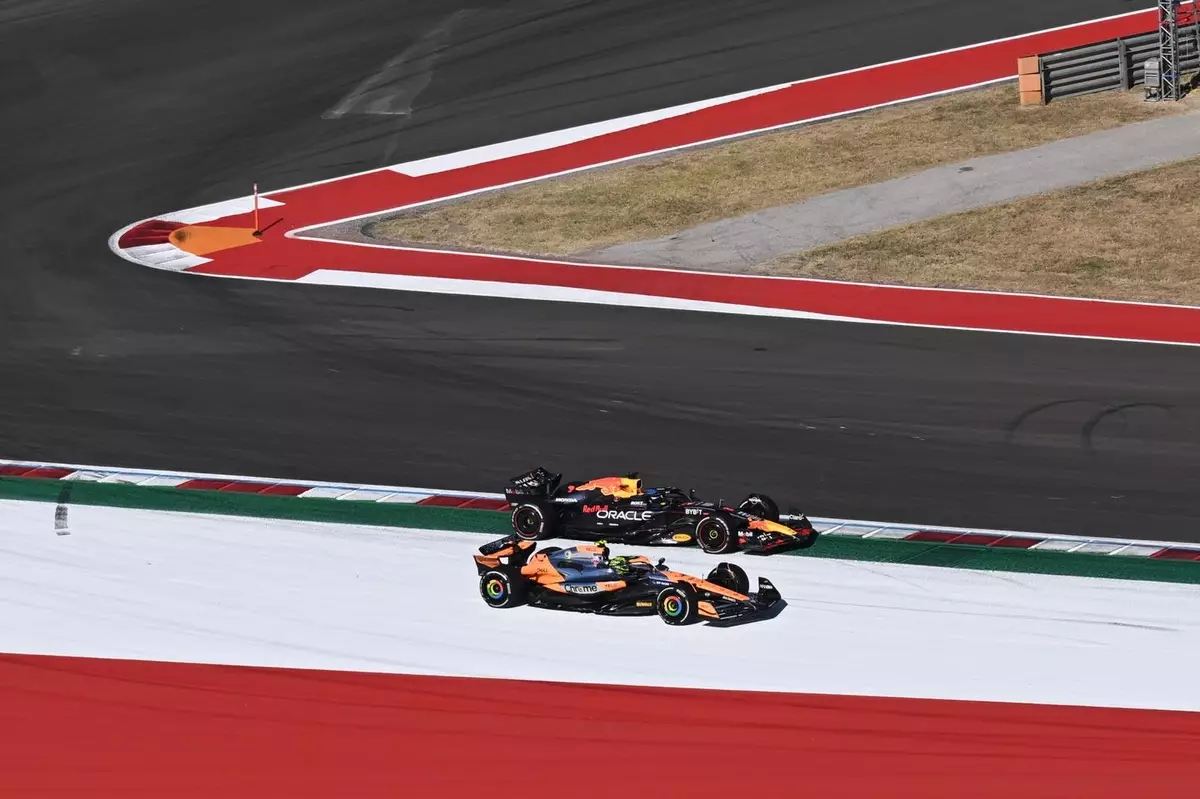McLaren’s Bold Move: Challenging Norris’s Penalty in Formula 1
In the high-octane world of Formula 1, where every turn and strategy can make or break a race, McLaren’s latest move has caught everyone’s attention. It’s not just about racing against time or opponents but also navigating the complex rules that govern this sport. Recently, McLaren decided to challenge a five-second penalty given to their driver, Lando Norris, at the United States Grand Prix. This decision doesn’t just highlight the team’s competitive spirit but also raises essential questions about fairness and interpretation in the sport.
This particular incident unfolded during the thrilling final laps of the race in Austin. As Lando Norris battled against Max Verstappen from Red Bull, both cars found themselves off the track in a daring maneuver. The stewards didn’t take kindly to this and issued a penalty that dramatically changed the race outcome. For Norris, it wasn’t just about losing time; it was about missing out on a podium finish he worked tirelessly for. Such decisions can significantly alter championship standings, affecting not just one driver but entire team strategies.
McLaren has turned to FIA’s International Sporting Code, specifically Article 14.1.1, to argue their case for reviewing the penalty. This article allows teams to request a review if they can present new and significant evidence. It’s a process that underscores the legal intricacies involved in Formula 1 races. As McLaren gears up for a video conference with the Austin stewards, they must convincingly demonstrate that new evidence could change the initial decision regarding Norris’s penalty.
Key Takeaways
- McLaren is challenging Norris’s penalty from the United States Grand Prix.
- The appeal involves presenting new evidence as per FIA’s regulations.
- This case highlights issues of fairness and rule interpretation in Formula 1 racing.
Behind McLaren’s Decision
Initially, McLaren’s team principal Andrea Stella expressed doubts about finding new evidence to support an appeal. This skepticism stems from the complex nature of Formula 1 penalties, where decisions often hinge on nuanced interpretations by race stewards. However, McLaren’s decision to pursue a right of review suggests they may have identified aspects of the incident previously overlooked. The team could be relying on technological data, innovative simulations, or unique onboard camera angles that strengthen their argument against the penalty.

This isn’t McLaren’s first brush with challenging stewards’ decisions; it draws parallels with Mercedes’ high-profile challenge at the 2021 Brazilian Grand Prix. In that instance, Mercedes questioned Verstappen’s actions against Lewis Hamilton using post-race footage as new evidence. However, their appeal was dismissed as the footage was deemed insufficiently significant to warrant reevaluation of penalties. This historical context brings into question how evidence is judged across different cases and whether McLaren will face similar hurdles.
The Review Process
The process to review such penalties is stringent and requires meticulous presentation of what constitutes “new and substantial evidence.” It’s not an easy bar to reach, especially when considering the potential consequences on championship standings. The stakes are high for McLaren; success would not only restore some lost points but also reinforce their credibility as fierce competitors in Formula 1. Conversely, failure could uphold the stewards’ authority while highlighting inconsistencies in how rules are applied.
The outcome of this review is eagerly anticipated by fans and experts alike as it could set precedents for future races and penalties. With the Mexican Grand Prix looming on the horizon, all eyes are on how McLaren navigates these regulatory waters. Their ability to present compelling evidence and challenge existing interpretations could redefine their season outlook and impact future competitions.
Implications Beyond Racing
The implications of this review extend far beyond immediate race results or championship points. A favorable outcome for McLaren would not only reinstate confidence in Lando Norris but also signal a shift in how racing rules are interpreted and enforced. It could lead to increased scrutiny of steward decisions in future races, potentially altering how teams approach strategic maneuvers during competitions.

This situation encapsulates more than just a singular race incident; it reflects broader themes within motorsport—justice, fairness, and competitive integrity. As fans eagerly await the review’s outcome, it’s clear that this decision holds ramifications beyond individual rivalries or team standings. It emphasizes the ongoing quest for balance between strict regulation adherence and recognizing exceptional driving skills under pressure.
Final Thoughts
In conclusion, McLaren’s bold challenge against Lando Norris’s penalty in Formula 1 embodies more than just a fight over race positions—it’s about pushing boundaries within regulatory frameworks while advocating for fairness on track. As we watch this story unfold ahead of upcoming races like Mexico City GP (Gran Premio de México), let us reflect upon its significance both within sporting contexts today as well those shaping tomorrow’s competitive landscapes globally across motorsports disciplines worldwide.
Formula 1
McLaren
Lando Norris
United States Grand Prix


Leave a Reply